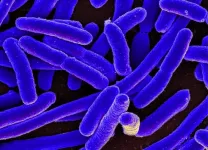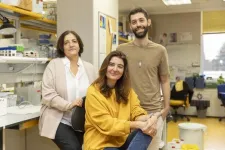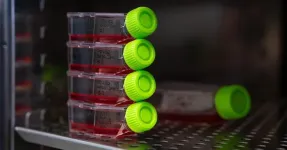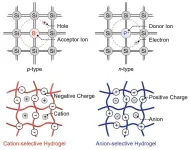(Press-News.org) Bacteria modify their ribosomes when exposed to widely used antibiotics, according to research published today in Nature Communications. The subtle changes might be enough to alter the binding site of drug targets and constitute a possible new mechanism of antibiotic resistance.
Escherichia coli is a common bacterium which is often harmless but can cause serious infections. The researchers exposed E. coli to streptomycin and kasugamycin, two drugs which treat bacterial infections. Streptomycin has been a staple in treating tuberculosis and other infections since the 1940s, while kasugamycin is less known but crucial in agricultural settings to prevent bacterial diseases in crops.
Both antibiotics tamper with bacteria’s ability to make new proteins by specifically targeting their ribosomes. These molecular structures create proteins and are themselves made of proteins and ribosomal RNA. Ribosomal RNA is often modified with chemical tags that can alter the shape and function of the ribosome. Cells use these tags to fine tune protein production.
The study found that, in response to the antibiotics, E. coli begins to assemble new ribosomes that are slightly different from the ones produced under normal conditions. Depending on which antibiotic used, the new ribosomes lacked certain tags. The tags were specifically lost in the regions where antibiotics latch on to and halt protein production. The study found this made the bacteria more resistant to the drugs.
“We think the bacteria's ribosomes might be altering its structure just enough to prevent an antibiotic from binding effectively,” says Anna Delgado-Tejedor, first author of the study and PhD student at the Centre for Genomic Regulation (CRG) in Barcelona.
Bacteria are known to develop antibiotic resistance in different ways, including mutations in their DNA. Another common mechanism is their ability to actively pump and transport antibiotics out of the cell, reducing the concentration of the drug inside the cell to levels that are no longer harmful.
The study is evidence of an entirely new survival strategy. “E. coli is altering its molecular structures with remarkable precision and in real time. It’s a stealthy and subtle way of dodging drugs,” says Dr. Eva Novoa, corresponding author of the study and researcher at the CRG.
The researchers made the findings using advanced nanopore sequencing technology, which read RNA molecules directly. Previous techniques would process RNA molecules in such a way that it would remove the chemical modifications. “Our approach has allowed us to see the modifications as they are, in their natural context," says Dr. Novoa.
The study does not explore why or how the chemical modifications are lost in the first place. Further research could explore the underlying biology of the adaptive mechanism and uncover new ways to combat one of the biggest looming crises in global health. Global antimicrobial resistance has claimed at least one million lives each year since 1990 and is forecast to claim 39 million more lives between now and 2050.
“If we can delve deeper and understand why they are shedding these modifications, we can create new strategies that prevent bacteria from shedding them in the first place or make new drugs that more effectively bind to the altered ribosomes,” says Dr. Novoa.
END
Bacteria ditch tags to dodge antibiotics
Modified ribosomes could be a new possible mechanism of antibiotic resistance
2024-11-29
ELSE PRESS RELEASES FROM THIS DATE:
New insights in plant response to high temperatures and drought
2024-11-29
Ghent, 29 November 2024 – We are increasingly confronted with the impacts of climate change, with failed harvests being only one example. Addressing these challenges requires multifaceted approaches, including making plants more resilient. An international research team led by researchers at VIB-UGent has unraveled how the opening and closing of stomata - tiny pores on leaves – is regulated in response to high temperatures and drought. These new insights, published in Nature Plants, pave the way for developing climate change-ready crops.
Global climate change affects more and more people, with extreme weather conditions ...
Strategies for safe and equitable access to water: a catalyst for global peace and security
2024-11-29
Water can be a catalyst for peace and security with a critical role in preventing conflicts and promoting cooperation among communities and nations - but only if managed equitably and sustainably, a new study reveals.
Experts have devised a blueprint to ensure safe, equitable and sustainable global access to clean water. The seven-point strategy will allow water challenges to be governed effectively so they do not create conflict when access is restricted or usage unfairly shared.
Publishing ...
CNIO opens up new research pathways against paediatric cancer Ewing sarcoma by discovering mechanisms that make it more aggressive
2024-11-29
Ewing sarcoma is a tumour of the bones and soft tissues that occurs in children and young people. A quarter of patients do not respond well to therapy.
The group led by Ana Losada, at Spain’s National Cancer Research Centre (CNIO), has discovered an alteration in the most aggressive cases that affects genes never previously related to this disease.
This finding expands the list of potential prognostic markers and therapeutic targets in the most aggressive cases of Ewing sarcoma.
The new research is published in EMBO Reports.
Ewing sarcoma is a tumour of the bones and soft tissues that occurs in children and young people. ...
Disease severity staging system for NOTCH3-associated small vessel disease, including CADASIL
2024-11-29
About The Study: The findings of this study suggest the NOTCH3-associated small vessel disease (NOTCH3-SVD) staging system will help to better harmonize NOTCH3-SVD and cerebral autosomal dominant arteriopathy with subcortical infarcts and leukoencephalopathy (CADASIL) cohort studies and registries; may improve individualized disease counseling, monitoring, and clinical management; and may facilitate patient stratification in clinical trials.
Corresponding Authors: To contact the corresponding ...
Satellite evidence bolsters case that climate change caused mass elephant die-off
2024-11-29
A new study led by King’s College London has provided further evidence that the deaths of 350 African elephants in Botswana during 2020 were the result of drinking from water holes where toxic algae populations had exploded due to climate change.
The lead author of the report says their analysis shows animals were very likely poisoned by watering holes where toxic blooms of blue-green algae, or cyanobacteria, had developed after a very wet year followed a very dry one.
Davide Lomeo, a PhD student in the Department of Geography at King’s College London and co-supervised by Plymouth Marine Laboratory (PML) and ...
Unique killer whale pod may have acquired special skills to hunt the world’s largest fish
2024-11-29
Killer whales can feed on marine mammals, turtles, and fish. In the Gulf of California, a pod might have picked up new skills that help them hunt whale sharks – the world’s largest fish, growing up to 18 meters long.
Whale sharks feed at aggregation sites in the Gulf of California, sometimes while they are still young and smaller. During this life-stage, they are more vulnerable to predation, and anecdotal evidence suggests orcas could be hunting them. Now, researchers in Mexico have reported four separate hunting events.
“We show how orcas displayed a collaboratively hunting technique on whale sharks, characterized by ...
Emory-led Lancet review highlights racial disparities in sudden cardiac arrest and death among athletes
2024-11-29
UNDER STRICT EMBARGO UNTIL 6:30 PM November 28, 2024:
A recent major review of data published by the Lancet and led by Emory sports cardiologist Jonathan Kim, MD, shows that Black athletes are approximately five times more likely to experience sudden cardiac arrest (SCA) and sudden cardiac death (SCD) compared to White athletes, despite some evidence of a decline in rates of SCD overall. SCA and SCD have historically been a leading cause of mortality among athletes, particularly those involved in high-intensity sports.
The disparities in SCA/D rates highlights the need for increased research into the social determinants of health in younger athletes, a topic that remains ...
A new approach to predicting malaria drug resistance
2024-11-28
Researchers at University of California San Diego analyzed the genomes of hundreds of malaria parasites to determine which genetic variants are most likely to confer drug resistance. The findings, published in Science, could help scientists use machine learning to predict antimalarial drug resistance and more effectively prioritize the most promising experimental treatments for further development. The approach could also help predict treatment resistance in other infectious diseases, and even cancer.
“A lot of drug resistance research can only look at one chemical agent at a time, but what we’ve been able to do here is create a roadmap ...
Coral adaptation unlikely to keep pace with global warming
2024-11-28
Coral adaptation to ocean warming and marine heatwaves will likely be overwhelmed without rapid reductions of global greenhouse gas emissions, according to an international team of scientists.
Their study, led by Dr. Liam Lachs of Newcastle University, reveals that coral heat tolerance adaptation via natural selection could keep pace with ocean warming, but only if Paris Agreement commitments are realised, limiting global warming to two degrees Celsius.
“The reality is that marine heatwaves are triggering mass coral bleaching mortality events across the world’s shallow tropical reef ecosystems, and the increasing frequency and intensity of these events ...
Bioinspired droplet-based systems herald a new era in biocompatible devices
2024-11-28
UNDER EMBARGO UNTIL 19:00 GMT / 14:00 ET THURSDAY 28 NOVEMBER 2024
Bioinspired droplet-based systems herald a new era in biocompatible devices
Oxford University researchers have developed a set of biocompatible devices, which can replicate or surpass many electronic functions but use ions as the signal carriers.
The ‘dropletronic devices’ are made from miniature soft hydrogel droplets and can be combined to produce diodes, transistors, reconfigurable logic gates, and memory storage devices that mimic biological synapses.
The research team generated a biocompatible, dropletronic ...
LAST 30 PRESS RELEASES:
Magnetic resonance imaging opens the door to better treatments for underdiagnosed atypical Parkinsonisms
National poll finds gaps in community preparedness for teen cardiac emergencies
One strategy to block both drug-resistant bacteria and influenza: new broad-spectrum infection prevention approach validated
Survey: 3 in 4 skip physical therapy homework, stunting progress
College students who spend hours on social media are more likely to be lonely – national US study
Evidence behind intermittent fasting for weight loss fails to match hype
How AI tools like DeepSeek are transforming emotional and mental health care of Chinese youth
Study finds link between sugary drinks and anxiety in young people
Scientists show how to predict world’s deadly scorpion hotspots
ASU researchers to lead AAAS panel on water insecurity in the United States
ASU professor Anne Stone to present at AAAS Conference in Phoenix on ancient origins of modern disease
Proposals for exploring viruses and skin as the next experimental quantum frontiers share US$30,000 science award
ASU researchers showcase scalable tech solutions for older adults living alone with cognitive decline at AAAS 2026
Scientists identify smooth regional trends in fruit fly survival strategies
Antipathy toward snakes? Your parents likely talked you into that at an early age
Sylvester Cancer Tip Sheet for Feb. 2026
Online exposure to medical misinformation concentrated among older adults
Telehealth improves access to genetic services for adult survivors of childhood cancers
Outdated mortality benchmarks risk missing early signs of famine and delay recognizing mass starvation
Newly discovered bacterium converts carbon dioxide into chemicals using electricity
Flipping and reversing mini-proteins could improve disease treatment
Scientists reveal major hidden source of atmospheric nitrogen pollution in fragile lake basin
Biochar emerges as a powerful tool for soil carbon neutrality and climate mitigation
Tiny cell messengers show big promise for safer protein and gene delivery
AMS releases statement regarding the decision to rescind EPA’s 2009 Endangerment Finding
Parents’ alcohol and drug use influences their children’s consumption, research shows
Modular assembly of chiral nitrogen-bridged rings achieved by palladium-catalyzed diastereoselective and enantioselective cascade cyclization reactions
Promoting civic engagement
AMS Science Preview: Hurricane slowdown, school snow days
Deforestation in the Amazon raises the surface temperature by 3 °C during the dry season
[Press-News.org] Bacteria ditch tags to dodge antibioticsModified ribosomes could be a new possible mechanism of antibiotic resistance





